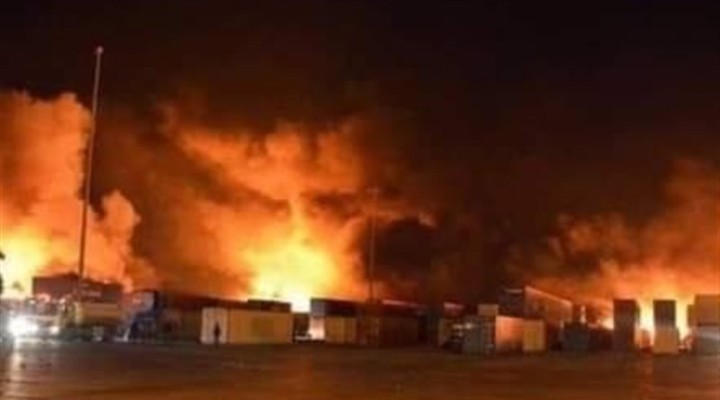Syria in the eye of the storm

Israel threatens, but Russia won’t play the role of guard dog
To understand the escalation of Israeli airstrikes against Syria amid renewed US diplomatic moves in the region, we need to go back to last week’s press conference held by Israel’s new foreign minister Gideon Saar.
This coincided with the handing by the US ambassador in Lebanon of a draft ceasefire agreement to Parliament Speaker Nabih Berri, and a surprise visit to Moscow by Israeli strategic affairs minister Ron Dermer.
Saar’s purpose was to highlight Israel’s targeting of Syria and impose debilitating terms on the country. “The goal of preventing Hezbollah from bringing weapons through Syrian territory to its bases in Lebanon is a basic principle on which any ceasefire agreement in Lebanon must be built,” he stated, and put the onus on Moscow to “contribute effectively to this objective”… or else.
In other words, a ceasefire agreement in Lebanon is being made conditional on weakening Hezbollah by preventing it from obtaining advanced Iranian weapons to replace those it has lost or will lose in future if the war of attrition it is currently waging against the Israeli interior continues — especially the heavy missiles and attack drones it has used to great effect against Israeli military and strategic targets in the north.
Israel has employed three means to try to achieve this objective of permanently severing Iranian military supply lines to Hezbollah.
First, escalating airstrikes on Damascus and its diplomatic suburb of Mazzeh, targeting the offices of Palestinian groups and Iranian envoys — including, previously, the Iranian consulate. The aim is to embarrass the Syrian leadership and goad it into a confrontation or retaliatory action it is not prepared for at present.
Second, destroying five of Lebanon’s border crossings with Syria, including the main Masnaa crossing, and reducing them to rubble on the pretext that they are used to smuggle weapons. The only one remaining is the Tripoli crossing in the north which has become so overwhelmed with travellers, displaced people and freight that vehicles have to wait up to four days to cross.
Third, it sent a strong warning Moscow to put pressure on the Syrian authorities and play an effective role in halting Iranian supplies to Hezbollah by targeting Syrian military sites near Latakia close to Russia’s airbase at Hmeimim, threatening its planes and personnel. The message was: either you cooperate and deliver on our demands, or your bases and influence in Syria will be in jeopardy.
Russia’s response to this crude extortion was delivered by President Putin’s envoy to Syria, Alexander Lavrentiev: “Preventing arms deliveries to Hezbollah through Syrian territory is not part of the Russian military mandate in Syria. Russian forces are present on its territory solely to fight terrorism and not to monitor borders or organise checkpoints.”
The conclusion that can be drawn from this is that Russia will not play the role of Israel’s guard dog in Syria. It considers the demands conveyed to it by Derner to be insolent in the extreme, according to sources close to decision-making circles in Moscow. Its more telling response was to leak news that the strategic cooperation agreement between Russia and Iran — which covers joint defence and advanced weaponry, including S-400 (and maybe S-500) air defence systems and Sukhoi fighter planes — is ready for signing in the next few days.
Syria finds itself in the eye of the Israeli storm. An old Israeli plan is being reived to try to drag it into a battle it is not ready for, given the blockade it is under and the presence of US and Turkish forces in its east and north, according to well-placed Syrian sources. But if Israeli threats persist and develop into assassination attempts against senior Syrian leaders, retaliation might become unavoidable. President Bashar al-Asad alluded to this in his speech at the Arab/Islamic summit in Riyadh.
Israel can no longer withstand the escalating war of attrition being conducted by the Hezbollah-led Lebanese resistance. That is why is got the US to intensify efforts to reach a ceasefire, albeit on its terms. When missiles and drones reach the headquarters of the defence ministry and military operations command in Tel Aviv, that means nowhere in occupied Palestine is safe from them.
Hezbollah has performed well in the war of attrition and must be extremely wary of the toxic US cease-fire proposal. It is an attempt to lure it into a trap in order to destroy it, like the trap it has been laying for Hamas in Gaza for the past 13 months. The resistance in Gaza has been alert to this and stuck firmly to its conditions. Hezbollah’s leaders, new and veteran alike, can be counted on to do the same
 TheAltWorld
TheAltWorld 
JESUS
Very good analysis and yes, Syria even if not prepared and reluctant will probably have no choice but add another Resistance front against the genocidal regime of ‘israel’.
Palestine, Hezbollah, Iran, Yemen, Iraq and Syria, the situation would become difficult for the zionist occupiers.
The logical refusal by Russia to be bullied by the small ‘israeli’ dog might explain why the demented trash and zionist uber-puppet Biden has suddenly authorized delivery of long range missiles to the jew zelensky, to divert Russia resources and punish Puntin for this refusal.
which proves that the agreement soon to be signed by Iran and Russia is a good thing and the visit in damascus of iranian officials for military alliances with Syria a logical outcome.
i would add that along s-400, Russia should also provide nuclear heads to Iran, just to make sure ‘israel’ is not longer the bully in the courtyard.